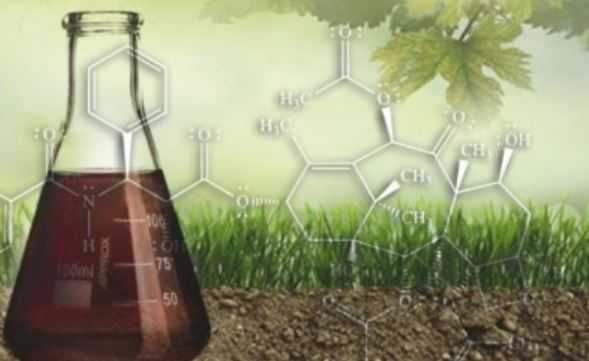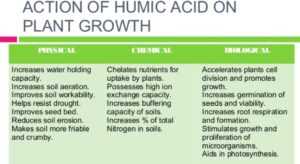The Real Story about Humic Acid
 THE REAL STORY ABOUT HUMIC ACID
THE REAL STORY ABOUT HUMIC ACID
Humic acid is potentially a miracle substance for the agricultural industry. It can decontaminate soil, chelate toxic metals, restore beneficial bacteria, kill pathogens, stabilize PH and more. The real question is, with all these benefits for plants, what can it do for humans? In an attempt to answer this question, I compiled several studies covering the effect of humic acid on humans, plants, and soil. Afterwards, I summarized my personal experiences with humic acid. Take a look below:
Humic Acid Studies
Improves Gut Bacteria
In one study, it was found that humic acids have a profound effect on healthy colonic microbiome. In fact, concentrations of 24 of the 35 substantial groups increased from 20% to 96%(2) In this study, they were referred to as “potentially interesting substances for the development of drugs that control the innate colonic microbiome”.
Kills Breast Cancer Cells
Humic acid was shown to destroy cancer cells in the recent study. Refer below for an excerpt which explains how humic acid effects cancer growth:
“Humic acid (HA) induces apoptosis and has various pharmacological properties including anti-inflammatory and anti-proliferative effects. In our study, we examined the cytotoxic effects of HA at concentrations of 5, 10, 20, 50 and 100 μg/mL in human breast adenocarcinoma MCF-7 cell line for 24 and 48 h. By using MTT method, it has been found out that HA 100 g/mL had cytotoxic effect on human breast adenocarcinoma MCF-7 cell line at both 24 and 48 h; also found out that the effective dose of HA at the same time (24 and 48 h) was 50 μg/mL.(3)”
Chelates Toxic Heavy Metals
There are several studies which demonstrate the chelating potential of humic acid. One study found that humic substances have a great potential to replace common washing agents for the remediation of cadmium contaminated soils. Besides being environmentally benign, humic substances can improve the physical, chemical, and biological properties of the soil. (4) If it can do this to soil, imagine what it could do to your body.
Increases Growth/Nutrient Uptake
The application of humic acid generates significant growth response.(5) This has been demonstrated in multiple trials at Soilbiotics.com, a leading humic acid distributor. Take a look at the chart below to see other ways humic acid can effect plant growth.

Improves ATP Energy Production
As you may know, ATP energy is the primary source of cellular energy in the human body. If humic acid can increase ATP energy in plants, it is possible it could do the same in humans. Here is the an excerpt from the study about how humic acid increases ATP production in plants:
“Humic substances increase production of high energy adenosine triphosphate (ATP) within plant cells.(6) As various metabolic systems are activated by humic substances, an increase in the production of high energy phosphate bonds (ATP) occurs. The high energy phosphate bonds of ATP function as a major driving energy for many different metabolic reactions in the plant”
Reduces Pesticide Levels
A study of the adsorption of pesticides and pesticide-like compounds on humic acid suggested that it can dramatically effect pesticide bioavailability in the soil (7, 8). I find this to be interesting for humans, given all of the pesticides we consume. In fact, in a recent study it showed Glyphosate use increased approximately 15-fold since 1994.(9) This lead to a 500% increase in human exposure over that time.
Protects Against Pathogens
Pathogenic enzymes bind to humic substances. As a result, pathogens are unable to invade potential host plants.(6) In short, humic acid binds to replication enzymes of bad bacteria, prohibiting further growth.
Kills the Herpes Simplex Virus
It was shown that the phenolic polymers present in the humic acid are inhibitors of HSV-1 replication.(10) This finding suggests humic acid could be effective against other viruses in the herpes family, like Epstein Barr Virus.
Inhibits Common Human Pathogens
In the study, it was found that humic substances inhibit St. epidermidis, St. aureus, Str. pyogenes, S. typhimurium, Prot. vulgaris, Ent. cloacae, Ps. aeruginosa and C. albicans, but not Str. faecalis and E. coli.(11) If humic acid been shown to kill these organisms, just imagine what others it could be helpful with.
My Experiences with Humic Acid
When I first started humic acid, I was hopeful, yet skeptical. The science of humic acid made sense, but I never found a trace mineral product that REALLY lived up to the hype. Finally, I discovered water extracted humic/fulvic acid, and noticed significant benefits immediately. Refer below for the top 5 changes I noticed:
Reduced Inflammation
I noticed a significant reduction in muscle and joint inflammation. In addition, I become more relaxed both mentally and physically. Also, muscle recovery time after intense exercise was greatly reduced.
Decreased Hunger/Cravings
My blood sugar became much more stable, and the need for food was FAR LESS intense. In addition, I have less cravings for sweets and protein. This is my FAVORITE benefit of all.
Metal Detoxification
I did notice symptoms of chelation like brain fog, hyperactivity, confusion, anger, etc. The good news is, they did NOT last long. In addition, a meal high in plant fiber seemed to relieve symptoms.
Improved Digestion
I noticed less indigestion when eating heavy foods. In addition, it doesn’t seem like food is moving through me as quickly. I believe this is a good thing, because at one point, it was the exact opposite. By allowing the food to sit in the small intestines longer, all of the nutrients can be extracted by beneficial bacteria before it enters the colon.
Increased Energy
I had a significant increase in energy, clarity, stamina, well-being. and overall mood. I noticed this the very first day I took humic acid, and once the detox phase was over, it became even more noticeable. Though you will get MORE energy from fulvic minerals, humic acid is the perfect complement to it. Keep in mind, the less toxic your body is, the better the minerals can absorb.
Common Questions about Humic Acid
Is Humic Acid Natural or Synthetic?
Humic Acid comes entirely from decomposed vegetation. As the vegetation died, it accumulated at the surface, and later was buried by rock, mud, sand and silt. The weight of these deposits compacted and removed all of the moisture. Over the ages, the vegetation underwent compaction and heating. It slowly carbonized and became coal.
Compaction then squeezed out the organic acids/esters present in the vegetation and formed a pool on top of the lignite coal bed. This pool dried, aged, and eventually formed “Leonardite shale“. During this process of decomposition, amino acids, carbohydrates and phenols turned into very complex products called “Humic Acids” which become locked in the shale. The humic acids are then extracted for supplemental use.
As you can see, this is probably the most natural supplement that exists. In addition, it’s the perfect balance of nutrients since it comes entirely from decomposed plant matter.
Difference between humic and fulvic acid?
Fulvic acid molecules, because their small size, can be absorbed by plant roots, stems, and leaves carrying trace minerals and other nutrients. This makes them very intriguing to humans interesting in replacing trace mineral deficiencies since their size allows them to penetrate cell walls.
Humic acid molecules too large for plant absorption, but they do improve soil health and homeostasis. In addition, humic acid provides a place for nutrients to be anchored so they don’t change chemically until absorbed by the plant root.
Is humic acid safe for humans to consume?
There is no science which proves humic acid is unsafe. As long as you have a good source of humates, I believe humic acid is safe. If it can improve the environment of the soil, I believe it can do the same for my body. None the less, do the research on your own and make whatever decision is best for you. I take it nearly every day myself.
What happens when first starting humic acid?
It depends on how healthy you are. In my experience, you will either get a energy boost or detox reaction. In most cases, the longer you have been sick, the more pronounced the detox reaction is. With me, it only lasted a few weeks and got easier every day. If you are NOT battling chronic illness, you should have very little detox reaction and instead, experience a calm/restorative energy.
Are there any downsides to humic acid?
You may experience detoxification reactions due to the chelation properties of humic acid. In my experience, they don’t last long. and can be eliminated with a meal high enough in plant fiber. Next downside is, it’s hard to find good quality humic acid for human consumption. If you are searching, make sure it’s water extracted and made in a plant that processes humic and fulvic minerals ONLY. This is very important to ensure product integrity and effectiveness.
Future of Humic Acid Use in Humans
There are very few studies currently on humic acid use in humans. The few that do exist show it can dramatically shift the gut microbiome, and even kill cancer cells. With such impressive results on plants, and now similar results on humans, I believe it’s just a matter of time before it really gets recognized.
I have personally seen more improvement from humic/fulvic acid than any other products. For this reason, I will continue to use it for as far as I can see forward.
If you have questions, feel free to contact me.
Matt Nedin
EndSickness.org
Phone: (734) 846-8619
Email: endsickness@gmail.com






